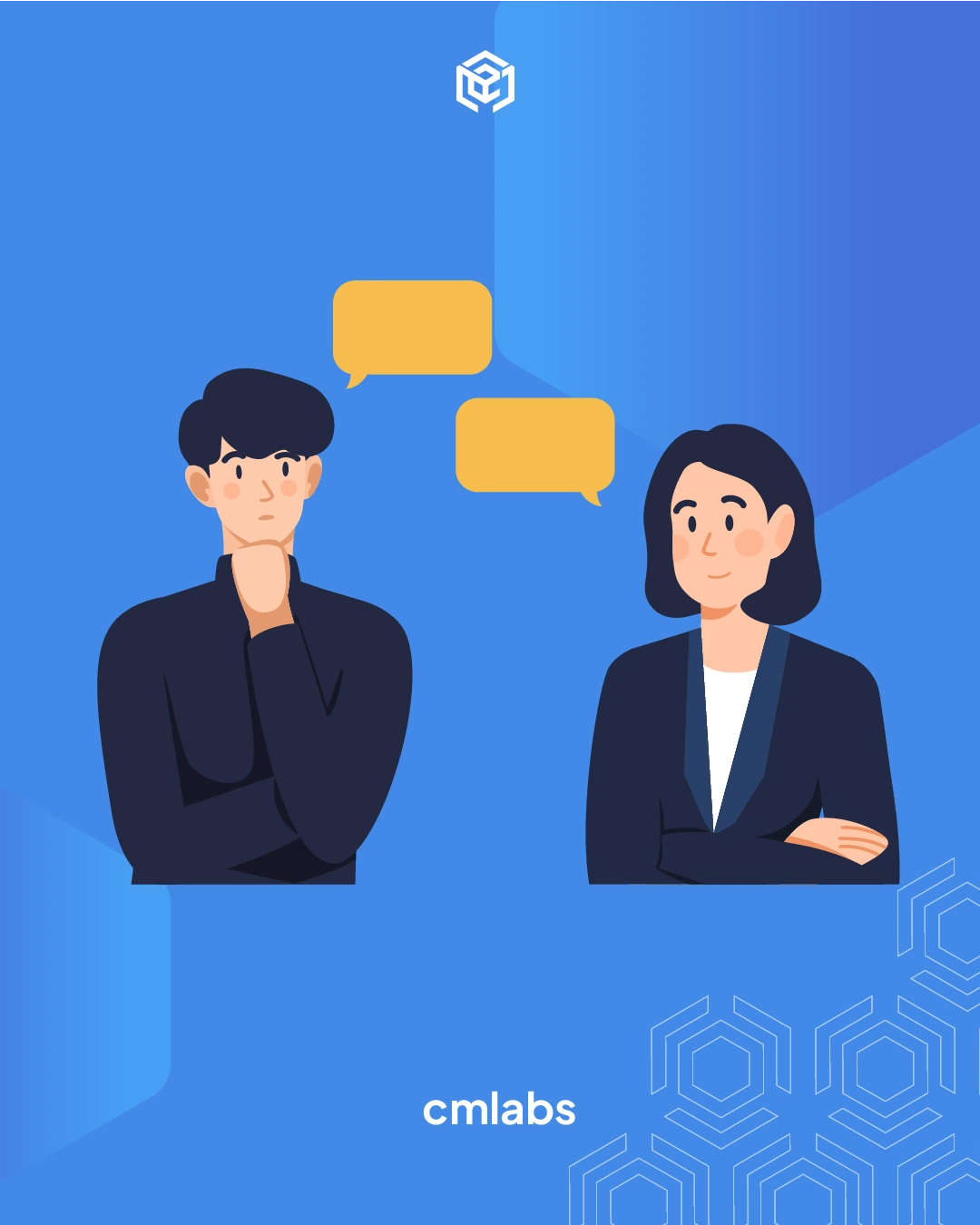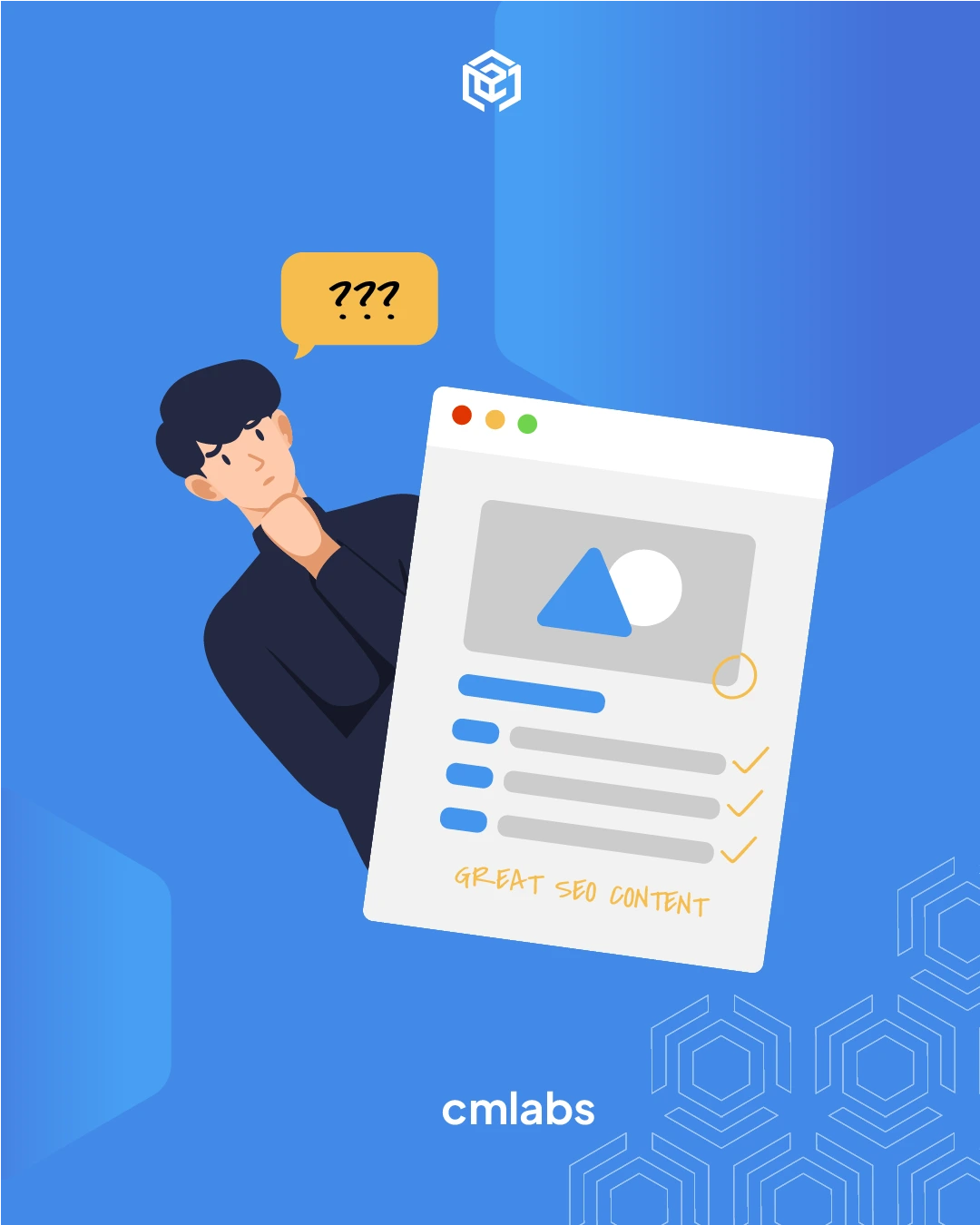We use cookies
This site uses cookies from cmlabs to deliver and enhance the quality of its services and to analyze traffic..
SEO SERVICES
Conduct in-depth technical website audits, strategically develop website projections, and increase your website authority.
ASO SERVICES
Elevate Your App’s Presence with Our Expert ASO Services – Boost Visibility and Drive Downloads!
WRITING SERVICES
We offer a variety of writing services to suit different business necessities. Reach broader audiences or lead specific industries? We've got you covered!
Get relevantly positive media exposure from bloggers and online publishers to increase your brand mentions on search engine results pages.
SEOlutions
A unified source of truth!
SEO & Digital Maternity Solution
SEO & Digital Maternity Solution: Leverage Cross-Platform Insights to Elevate Your Strategy with Expert Consultation
SEO & Digital Maternity Solution
Data Solution options:
Starting from Rp200 mio
Reinventing how a company get creative treatments
A new way to get your creative needs done. Agile team, efficient cost, and expedient way in a flexible yet scalable subscription plan!
Creative-as-a-Services
CaaS package options:
Based on Subscription
Pioneer in digital marketing software powerhouse
We’re excited to unveil our new range of Tech Solutions designed to drive your digital success. Whether you’re looking to enhance your website’s performance, streamline your tech stack, or unlock deeper insights from your data, we’ve got you covered.
Starting from Rp250 mio
Our Clients
Research and innovation center for digital transformation
Digital marketing combines technical skills and business knowledge at every stage. For marketing teams, improving budget management efficiency is crucial, as time is an invaluable resource that should be used wisely. At Sequence, we are dedicated to empowering you to optimize efficiency and strategic planning, ultimately enhancing the impact of your digital marketing efforts.
Subscription-based (IDR1,800/keyword)
Our Clients
BeyondSEO
References
SEO Tools for Webmasters
SEO Tools for Writers
SEO Tools
FIND THE SUITABLE PARTNERSHIP FOR YOUR COMPANY
Check out which cmlabs partnership program suits your company
WHITE LABEL SEO
for CorporateYour company is granted exclusive partnership rights to provide SEO services to our important clients, and we will provide a dedicated backend team to support your efforts.
AFFILIATE PROGRAM
for BizdevA new affiliate program is being introduced for skilled marketers and individuals with strong networks, offering commissions of up to 7% for generating profits independently.
DIGITAL AGENCY
for Marketing Partnerscmlabs is an essential partner for digital agencies, providing a unique selling proposition in Search Engine Optimization (SEO).
BACKLINK PARTNERSHIP
for Media / BloggerWe have a vast database of bloggers and media outlets across Indonesia, categorized by region and media type, giving our clients an edge in managing their media and SEO activities.
OFFICIAL TRAINING
We provide ongoing professional development and support to SEO professionals to ensure they are equipped to meet market demands.
JOIN AS CONTRIBUTOR
for Content WriterGreat opportunity for SEO Writers around the world. T&C applied!
ACADEMIC PARTNERSHIP
Through partnerships with universities in Indonesia, cmlabs has helped align academic curricula with industry demands.
Partnership
Sector & Industries
Tell us your SEO needs, our marketing team will help you find the best solution
As an alternative, you can schedule a conference call with our team
Schedule a Meeting?Contact
Survey
We use cookies
This site uses cookies from cmlabs to deliver and enhance the quality of its services and to analyze traffic..
Last updated: Oct 04, 2024
URL parameters, also known as query strings, are elements contained in URLs that are used to help users filter, organize content, or perform searches on websites.
These parameters are located in the section after the question mark (?), which includes keys and values and are separated by an equal sign (=), or some of them are separated by an ampersand sign (&).
URL parameters serve to perform various commands that help manage and organize information on the website more specifically.
With these URLs, you can track traffic sources, filter and sort information, and apply functions such as search and pagination to improve user experience.
In addition, these parameters also allow customization of content display based on user preferences, such as language or specific categories.
These URLs not only make it easier to navigate and access specific information but also help users in the data analysis process.
To improve the functionality and maintainability of a website, there are several types of URL parameters that have different functions, including:
These parameters are used to track user activity on the website and can be applied to measure the effectiveness of advertising or marketing.
This type of URL parameter is used to select and organize content based on certain criteria, such as price, date, or popularity. Therefore, sorting is often implemented in e-commerce to assist users in finding the products they are looking for.
Furthermore, searching, this parameter is commonly used to filter search results based on keywords or phrases used by users.
This parameter is used to search and recognize certain elements on a web page, such as detailed product information or specific articles.
Moving on to pagination, this parameter is used to navigate between pages of long content such as product listings.
Translating is a parameter that displays content in different languages according to user preferences.
Last but not least, filtering is used to sort content based on certain criteria such as price range, category, or location. This parameter can narrow your search results so users can find what they're looking for faster.
Parameterized URLs have many benefits, but if not managed properly, they can cause trouble for SEO, here are the problems:
The problem that often occurs due to URL query strings is that there are different duplicate versions of the same page. This makes it difficult for search engines to determine which pages should be indexed or displayed in search results.
Search engines have a limit on the number of pages they can crawl in a single session. The URL parameter causes search engines to spend a lot of time and resources crawling multiple versions of the same page.
If ignored, this can reduce the efficiency of the crawl, limit the indexing of other important pages on the site, and increase the crawl budget.
URL parameters will trigger multiple versions of the same page and keyword cannibalization.
This means that different versions of the same page are competing for the same keywords. If this happens, then the chances of getting ranked 1 in the search results will decrease.
In addition, long and complex URLs that contain many parameters will make them difficult for users to read and understand. This may reduce the number of clicks and shares as well as decrease the user experience.
Last but not least, poorly managed parameters can break up the value of a link between different versions of a page.
This can reduce the SEO effectiveness of the main page, as it should have the entire link value, which will harm search results.
To prevent SEO problems due to the use of parameter URLs, it is important to manage them properly and effectively. Here are some tips to manage parameter URLs you can apply:
First, make sure to implement a consistent internal link structure throughout your website. By doing this, you can avoid duplicate versions of the same page caused by query strings.
Consistent internal links will help search engines understand your site structure better and point directly to the main version of the page. This minimizes the risk of duplicate content and wasted crawl budget.
Additionally, you can use canonical tags on pages with URL parameters to signal to search engines which pages should be considered the original version.
These tags can help address duplicate content issues by alerting search engines. In addition, canonical tags can also help establish which main pages should be prioritized in indexes and rankings.
Last but not least, you can use the robots.txt file to block search engine crawlers' access to URLs that contain certain parameters.
This will prevent search engines from crawling and indexing unnecessary or duplicate pages.
By implementing this step, you can reduce your crawl budget and ensure that only relevant and valuable pages are indexed by search engines.
WDYT, you like my article?
Couldn't find result for "Mulki" try to search with different keyword
Suggestion:
Tell us your SEO needs, our marketing team will help you find the best solution
As an alternative, you can schedule a conference call with our team
Schedule a Meeting?



cmlabs Jakarta Jl. Pluit Kencana Raya No.63, Pluit, Penjaringan, Jakarta Utara, DKI Jakarta, 14450, Indonesia
(+62) 21-666-04470These strategic alliances allow us to offer our clients a wider range of SEO innovative solutions and exceptional service.

Psst! Hey there, SEO Stats and Tools SEO company! If you've ever planned of conquering the Indonesia market, you've come to the right place!